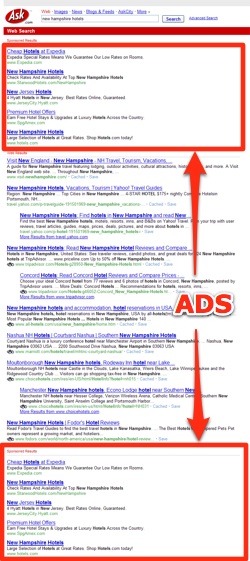Ask.com Plays The Google AdWords Arbitrage Game
Ah, Ask.com. Since I wrote their obituary in March, not much has got me thinking they’ll make a comeback. Sure, there was the gimmick of kind of bringing back Jeeves himself. But the spate of “hotels.ask.com” ads I see them running on Google makes me think they’re dropping further from being a search engine and […]
Ah, Ask.com. Since I wrote their obituary in March, not much has got me thinking they’ll make a comeback. Sure, there was the gimmick of kind of bringing back Jeeves himself. But the spate of “hotels.ask.com” ads I see them running on Google makes me think they’re dropping further from being a search engine and more into a search arbitrage play.
Take a look at this search for new hampshire hotels:
See the ad? It promises that you can “Book here & Save A Massive 50%” with the site listed being New-Hampshire.Hotels.Ask.com.
Click on the ad, and you get this:
Rather than taking you to a place where you can really book a hotel room (which the ad promises) and rather than really offering up to 50% off (no prices are offered at all, right?), you simply get search results from Ask. Five paid listings at the top, 10 unpaid listings sandwiched between, then the same five listings you saw at the top of the page repeated. Why not five new ads at the bottom? As a Google partner, I assume Ask can tell which ads are willing to pay the most per click and keeps the page focused only around these possible big money earners.
Ads from Google, on Ask? Yes, Ask has long carried Google’s ads. Every one of those ads carries a Google tracking code, so they certainly don’t seem to be those that Ask sells through its own program.
So what’s the point of Ask running these ads? Search engine have long run ads on other search engines to generate search traffic. For example, if I search for cashback, I get this ad from Microsoft touting its Live Search Cashback service:
Or if I search for apples, I get this from Live:
That takes you to these image search results at Live for pictures of apples.
What Ask is doing is a different thing entirely. Rather than promoting its own product (as with the Cashback example), or drumming up some incremental searches for its site (as with the apples example, or by saying something like “New Hampshire Hotels? Try Ask.com For Better Results”), Ask is using specific text to make you think you can conduct and conclude a purchase at their web site, when you cannot. Instead, what you are far more likely to do is click on a Google ad that Ask carries, earning Ask money (and almost certainly more money than they paid to get your click from Google).
It’s not just New Hampshire Hotels that are being targeted. Ask has ads going after a variety of locations, as this Google search reveals, including:
- germany.hotels.ask.com
- maine.hotels.ask.com
- BellGardens-CA.Hotels.Ask.com
- Calistoga-CA.Hotels.Ask.com
- Oregon.Hotels.Ask.com
Those matches are all pages that have Ask ads contextually placed across the web through Google’s AdSense program.
I’m surprised Google’s allowing these ads. For one thing, they’ve been cracking down on arbitrage for well over a year, in particular introducing new guidelines that specifically name “travel aggregator” sites in September 2007. What Ask’s doing seems to be making it a travel aggregator site to me. Certainly someone clicking from a Google ad to another page filled with the exact same ads they’d seen before isn’t a unique or useful user experience.
The ad copy, which promises the ability to book and save, seems to go against the “overarching rule” Google has that ads should:
- Clearly and accurately represent your site.
- Emphasize the unique benefits of your product or service.
I don’t know where the 50% off figure comes from used in the ad. Google’s policy about discounts is that they should be “accurately displayed on your website within 1-2 clicks of your ad’s landing page. Nothing on the “landing page” of Ask’s search results leads one click away to an explanation of the discount that was in the ad.
While I’m surprised Google’s allowing the ads, I’m not surprised Ask is running them. It’s just a further sign to me that the future of Ask isn’t about building an audience but instead earning as much off the remaining traffic it has left.
Postscript: Ask emailed me this:
We wanted you to know that this was an isolated incident that was incorrectly managed by one of our SEM agencies. We’ve already taken proactive steps to eliminate it and to ensure that this doesn’t occur again. Our policy is to have our ad creative provide a clear and accurate description of the search results that are generated for each and every query.
Contributing authors are invited to create content for Search Engine Land and are chosen for their expertise and contribution to the search community. Our contributors work under the oversight of the editorial staff and contributions are checked for quality and relevance to our readers. The opinions they express are their own.
Related stories
New on Search Engine Land



